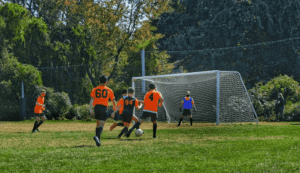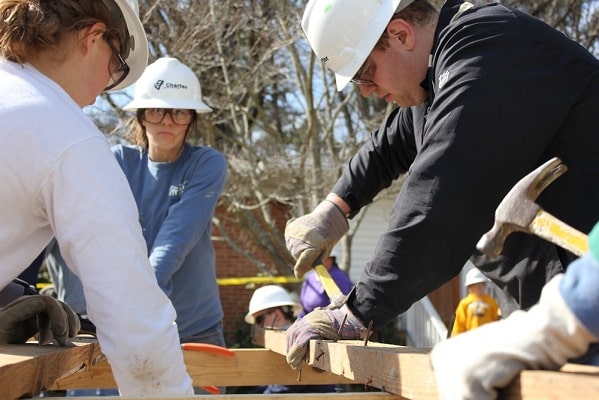With online learning gaining more momentum in the UK, many parents, students, and educators have had to navigate learning at home using digital mediums.
While many less established, less reputable online schools have popped up since the pandemic, long-established selective schools like Cambridge Home School are the sensible choice. We know that the best homeschooling programs must be supported by other activities that help children explore diverse interests and improve overall wellbeing.
Between online classes, we encourage children to take on extracurricular activities outside the standard educational curriculum. These activities can help fuel your child’s passion and boost academic and social skills.

The Benefits of Participating in Extracurricular Activities
Getting involved in societies, sports clubs, part-time work, and volunteering are all excellent ways to use free time. Here are some of the top benefits of participating in these extracurricular activities:
- Allow your child to develop new skills that enrich their lives for years to come.
- Instil a sense of belonging and improve social development as children interact with others.
- Improve self-esteem; a study revealed that adolescents participating in extracurricular activities had lower levels of anxiety and higher levels of optimism.
- Extracurricular activities help build positive habits, including time management skills, persistence, and community involvement.
- Boost academic performance; one study found that children who engage in extracurricular activities show improvement in educational outcomes, such as course grades, reading, and math.
Depending on the nature of the activity (physical, creative, or intellectual), there are plenty of options that can help build skills in various developmental areas.
Here are a few choices that can help your teen discover a hobby that may ignite a true passion.
1. Sports
Sports activities are some of the most common extracurricular activities in the United Kingdom. Soccer clubs, swimming lessons, and cricket training camps are popular with students as young as preschoolers. Many city recreation departments offer spaces for sports practice, and you can also opt for private lessons.
Sports clubs are an excellent way to promote physical activity. Given that children spend several hours a day sitting during school lessons, exercise is of the utmost importance.
Exercise can help lower the risk of many physiological ailments, such as high blood pressure, high cholesterol, metabolic syndromes, and obesity. At the same time, it has also been linked to improved mental health as it boosts mood, improves cognitive function, and enhances energy.
2. Martial Arts

Martial arts and boxing are some of the most popular sports in the UK. Depending on your child’s interests and agility level, there are various art forms that your teen may want to try.
Judo, for instance, generally requires a high level of agility and flexibility. Other forms include striking arts such as Karate and Taekwondo require significant focus, fast reflexes, and swift footwork.
Martial art is a brilliant form of exercise because it involves a full-body workout. It helps increase flexibility, coordination, and response time. It can also equip the learner with necessary self-defence skills.
3. Dance
Teens that aren’t interested in sports may be interested in dance. In addition to providing a full-body workout, dance classes help teenagers socialise, which boosts their self-confidence.
Plus, it’s a great way to unwind. While your children may argue that they feel more relaxed after playing video games or watching movies, spending a prolonged period on these hobbies can make children lethargic.
Dance is a form of self-expression that even introverts swear by. Much like mixed martial arts, it helps teenagers blow off steam while staying disciplined and focused on their movements.
4. Gymnastics
Children often take up gymnastics to support other activities such as sports training or dance training. Other times, children may take up gymnastic lessons to enjoy the athletic skill on its own. Either way, it’s a great way to help your child improve flexibility and coordination.
More so than any other sport, gymnastics focuses on the fundamentals of movement. As children develop dexterity, they learn about graceful movement and the importance of a healthy body.
5. Community Service

Community service is an excellent activity that can teach your children some valuable life skills outside the classroom setting. Above all, community service helps teens learn about the value of empathy and being grateful.
Children are able to build ties with community members and become more aware of their surroundings and the people around them. Exposing your children to diverse people, age groups, situations, and issues will help them become more accepting.
As they participate in volunteer opportunities, they will likely take on more responsibility and develop essential team management and leadership skills that’ll help them throughout their lives.
Recommended Read: Does Online Schooling Help Children Become More Empathetic?
6. Painting
While painting and drawing are often encouraged in younger children, their therapeutic effects for teenagers are often overlooked. For teens who struggle to convey their feelings, creative activities, such as painting, sculpting, and photography, can help them express their thoughts.
The process often focuses on thinking outside the box, free expression, and building personal insight. By expressing pent up emotions, children can regain self-control and confidence through the process. Consequently, they perform better at school and hone their artistic skills alongside classes.
7. STEM Programs
For children who enjoy STEM subjects (science, technology, engineering and mathematics), there are several avenues where they can explore their interests beyond the classroom.
STEM programs are designed to encourage exploratory learning and problem-solving across a variety of disciplines and tasks. They make science and math more fun, providing hands-on experience that fuels creativity, knowledge application, and experimentation.
Video game development, coding, and LEGO-based robotics are some examples of the STEM programs offered to students worldwide.
Recommended Read: 3 Activities That Will Fuel Your Child’s Passion for All-Things-Science
8. Horseback riding

Horseback riding offers a great opportunity for you to get your teens off the couch and out into nature. Riding is an excellent form of exercise that keeps you active during the day. A 2011 study of the British Horse Society even found that general horseback riding—if done for a minimum of 30 minutes, at least thrice a week—counts for moderate-intensity exercise.
In addition to aerobic benefits, your teen’s coordination, flexibility, and balance are also developed through riding.
What’s more, horses make for great riding companions and the bonds a rider makes with their horse tends to last a lifetime. A study found that youngsters who work with horses displayed lower stress hormone levels known as cortisol.
9. Cooking

Cooking is a valuable life skill that everyone should have, regardless of the resources at hand. Every parent wants their child to be self-reliant and independent—and cooking can help them get one step closer. A teen who knows they can look after themselves will be more open to taking on life’s challenges.
Teenagers who exhibit creative ability usually thrive in this area, as it serves as an interesting creative outlet. They get to relax, enjoy, and experiment with food and flavours while understanding the importance of healthy eating.
10. Gardening
Convincing your teen to put away the phone and join you outside may seem like a long shot, but given the right tools, encouragement, and opportunity, you may be able to foster a love of gardening in your child. The best part is that you don’t need sprawling greens to enjoy this activity; many fruits and vegetables can be grown in small containers, wall-mounted racks, or even in community gardens.
Gardening instils a sense of responsibility as they nurture seeds into blooming flowers. In many ways, it’s like crop farming in Minecraft or caring for your crops in Animal Crossing.
The outdoor time promotes physical exercise and can even encourage healthier eating habits in your child. At the end of the day, your children can quite literally reap what they sow.
Choosing and Scheduling Afterschool Activities for Your Teen
When trying to get your teen interested in afterschool activities, it’s better to give them options and letting them decide. Look for activities sponsored by local recreation departments that they can pursue during their free time in order to recharge.

Regardless of the activities you choose for your child, it’s important not to overschedule. It’s essential to understand your child and their preferences first.
Some children thrive with busier schedules and can handle more than one activity, while others require more downtime between school and extracurricular activities.
A good rule of thumb is to cut back on activities if your child struggles to get eight hours of sleep every night or has trouble getting homework done.
Complementing Distance Learning with Extracurricular Activities
There’s no denying that homeschooling options for GCSE have gained a lot of traction in the last few years. An online private school offers some excellent advantages for children and parents, including enhanced flexibility, a better quality of education, reduced instances of bullying, and improved mental health.
Recommended Read: How to Navigate the Homeschooling Adjustment Phase as a Parent
Cambridge Home School provides quality education across four schools, including Primary Prep and Lower School. Recognised for helping students secure top grades, the institution puts its students’ academic growth and holistic development first. By balancing both components of a student’s life, our MA/PhD qualified subject specialist teachers enable students to achieve high levels of academic success.
Our one of the best online international school provide quality British online education across four schools: Primary Prep/Key Stage 2 (ages 8 to 10), Lower School/Key Stage 3 (ages 11 to 13), Upper School/IGCSEs (ages 14 to 16), and Sixth Form/AS & A Levels (ages 17 to 19). Students from the UK, Europe (including Western Russia), Africa, the Middle East, and Central Asia are encouraged to apply.
We’re trusted by parents in the UK and abroad because we offer:
- Independent curriculum
- Small classroom sizes (8 to 10 pupils per group)
- Comprehensive online library of resources for students
- Cutting-edge online education systems
- Focus on students’ mental health
- Impressive track record
- Three parent consultations each year
- Focus on personal growth
- Sufficient scholarships and bursaries
- 24/7 parental access to children’s coursework
They also offer one-on-one success coaching and pastoral support to ensure children are happy and successful achievers. For more details about our virtual school in London, interested students and parents can go through their Admissions guidelines.
—
FAQ
What are the benefits of online learning in the UK, especially with established schools like Cambridge Home School?
Online learning, especially with well-established institutions like Cambridge Home School, provides an enhanced quality of education along with reduced instances of bullying and improved mental health. These schools offer small classroom sizes and a comprehensive library of online resources, ensuring a focus on both academic growth and holistic development.
Why is participating in extracurricular activities important for children?
Participation in extracurricular activities allows children to develop new skills and instils a sense of belonging. It also positively impacts social development, self-esteem, and time management skills. Activities outside of standard educational curriculum can also improve academic performance and overall wellbeing.
What types of extracurricular activities are commonly available in the UK?
Extracurricular activities can range from sports like football, swimming, and cricket to arts like dance and painting. Other options include martial arts, gymnastics, community service, STEM programs, horseback riding, cooking, and gardening. These activities are available through local recreation departments or as private lessons.
How does Cambridge Home School support students’ overall development?
Cambridge Home School balances academic learning with activities for holistic development. The school employs MA/PhD qualified subject specialist teachers and provides one-on-one success coaching and pastoral support. It also offers three parent consultations each year and 24/7 parental access to children’s coursework.
What should parents consider when scheduling afterschool activities for their children?
It’s important not to overschedule your child with extracurricular activities. Understanding your child’s preferences and capacities is essential. If a child struggles to get sufficient sleep or has trouble completing homework, it might be a sign that they are overscheduled.